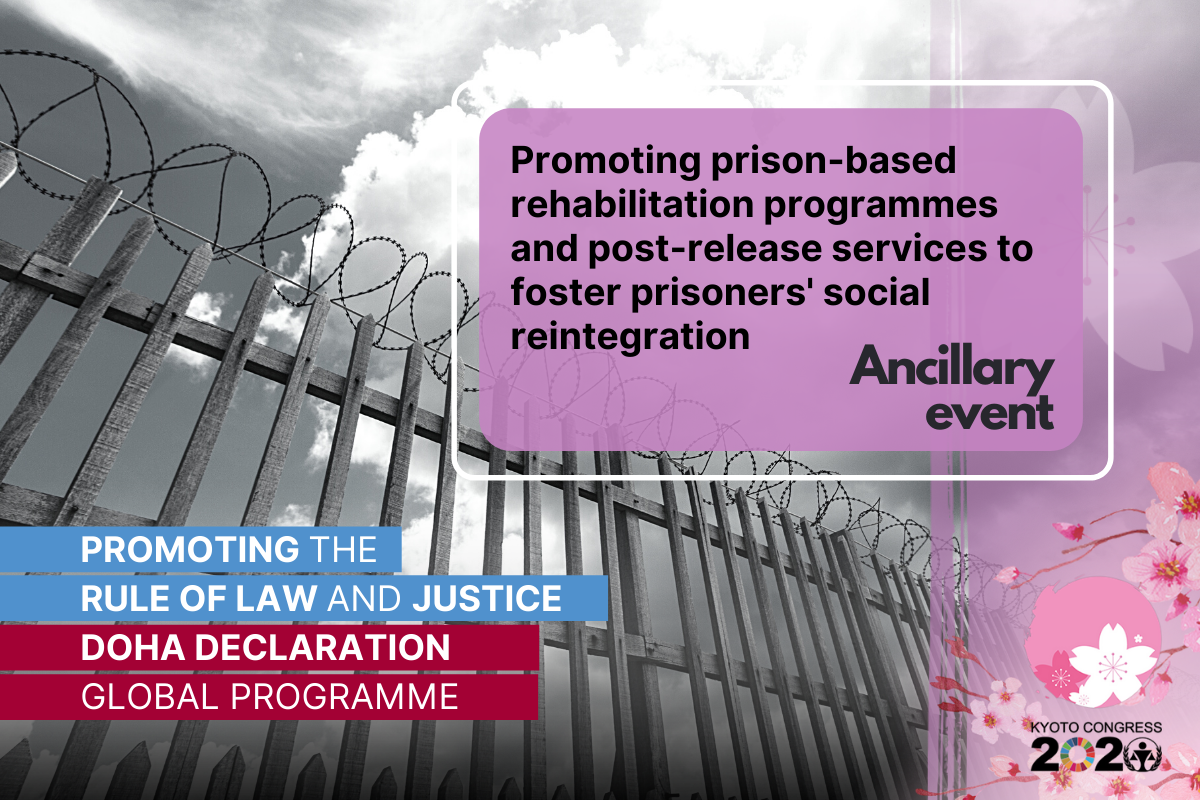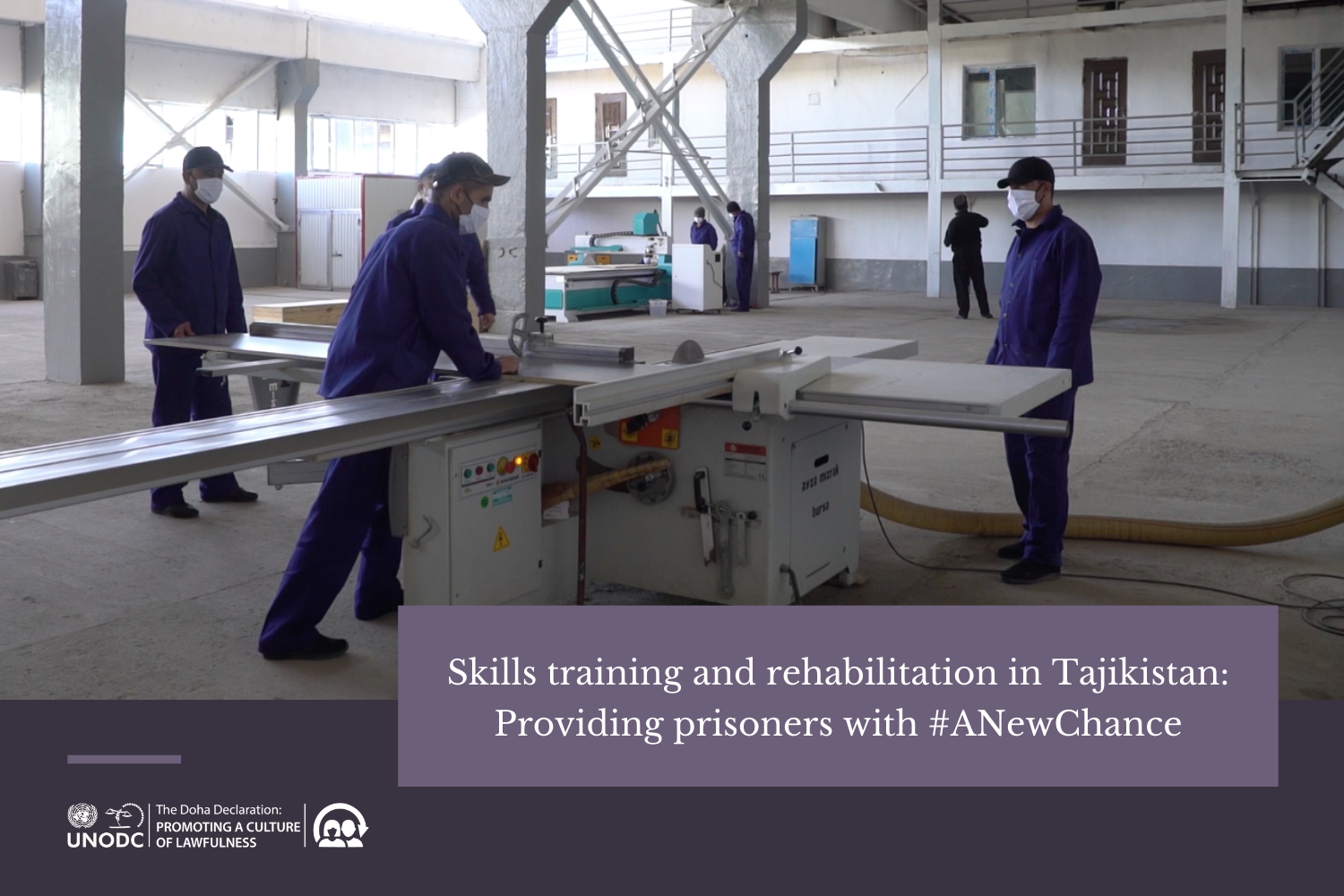To rehabilitate is to help find work
There is a global strategy for crime prevention; Bolivia has a model rehabilitation project.
Interview conducted by Iván Bustillos, published on 3 March 2019 in the newspaper La Razón (La Paz, Bolivia)
---
The mission took place between 25 and 28 February to follow up on the implementation of the "Building Freedom" project, which is being implemented thanks to the financial support of the State of Qatar through the UNODC Global Programme for the Implementation of the Doha Declaration. The project allows the training of 50 women prisoners in two prisons in La Paz (Obrajes and Miraflores), to develop both their technical skills in the construction sector and their personal skills, to help them find work and facilitate their reintegration into society.
During the mission, several high-level meetings were held with national authorities, such as the Minister of Government, the Deputy Minister of Justice and Fundamental Rights, the Deputy Minister of Foreign Trade and Integration, the Ombudsman's Office, and the Director General of the Penitentiary System.
---
For at least three years, at the global level, crime prevention and criminal justice have been guided in their work by the Doha Declaration, a series of international principles adopted by UN Member States following the 13th Congress on Crime Prevention and Criminal Justice, held precisely in Doha, the capital of Qatar (Asia), in April 2015. In order to implement the Doha Declaration, and with the economic support of the State of Qatar, the United Nations Office on Drugs and Crime (UNODC) launched a Global Programme to help States progress in crime prevention, improvement of criminal justice, measures against corruption and strengthening the rule of law. In this period, Marco Teixeira (MT), head of the Global Programme, and Muriel Jourdan (MJ), Prevention and Criminal Justice Officer (at UNODC in Vienna) who works in rehabilitation, came to the country, making from a Bolivian initiative a model experience at the international level.
 What are you doing to implement the Doha Declaration?
What are you doing to implement the Doha Declaration?
MT: Our role [as a Global Programme] is to support the creation of a roadmap to achieve the objectives of the Doha Declaration. We work directly with more than 200,000 people, providing technical and training assistance. We work along four main lines: one, promoting judicial integrity and supporting states to have an independent judicial system, or rather, let's say, a system accountable to society. Two, we promote crime prevention based on sport, working with more than 400 coaches and over 4,000 vulnerable children who were at serious risk. Three, in Education for Justice, we assist teachers in promoting the rule of law, integrity and law enforcement. And four, we have the social reintegration of people in contravention with the law and who were emprisoned.
What has been achieved against judicial corruption?
MT: We created a Global Judicial Integrity Network, which includes more than 400 judges and judicial associations, and sets out the strategic priorities in this line of UNODC support. We also produced specific training materials for judges and actors in the judicial system. We also have specific products for research, media use, digital platforms, among others.
Since criminal justice is at the core, is there a standard judge promoted at a global level?
MT: This requires a functional and professional code of ethics, on which we are working with the Global Associations of Judges. Another factor that we think is essential to promote judicial integrity is the civic, social and personal behaviour of judges; a very solid legal and technical preparation, but also a very solid individual and social ethical behaviour, and, above all, guaranteeing their independence as judges.
How are electronic media being incorporated into this?
MT: As part of Education for Justice, we produce electronic content to enhance prevention in primary and secondary educational age groups. We will launch new tools, including electronic platform games, as well as more classic games to support professors in teaching values of transparency, integrity, ethical behaviour.
 In a nutshell, what is "Building Freedom"?
In a nutshell, what is "Building Freedom"?
MJ: It is a very innovative project that we are doing in Bolivia; we are talking about this in many parts of the world as being a model. After an analysis of the local context, we saw that we needed to change habits, and to change the type of training given to women, which is always the same, sewing and so forth. We want to break with gender stereotypes and give them more opportunities to find a job with which they can earn a living. In the analysis, we investigated where there was employment, and we saw that they are looking for qualified female labour in the construction sector; that is a fact, we have not invented it. So, we decided to provide training for women so that they have the technical construction skills. But we also work on self-esteem, because it is known that women are more vulnerable and, in many cases, have been victims of domestic violence; it is even more difficult to socially reintegrate a woman prisoner than a male. Many people think that social reintegration begins when you get out of prison, but that is not true: it is a process that begins a long time before.
There are three stages: one in which to work with judges, because they can take decisions, give alternative sentences. Then, in prison where there is a lack of rehabilitation programs that make sense, and that are linked to the demand of the labour market. We have to be more realistic, to stick to the local context in terms of the labour market.
The innovation is also in preparing women builders, a traditionally male field.
MJ: It is an innovation, but there are already women working in construction, it's nothing new; we just need to support this, and to change the vision of women in society. In addition, we connect women with a professional association of women working in the construction sector. That is to say, when the woman is liberated, she does not remain alone, looking for work with the stigma and other difficulties; she is going to be in touch with the association that will support her in finding work, or in creating or promoting microenterprises.
 Now, greater skills in construction ...
Now, greater skills in construction ...
MJ: The good thing is also that they are going to have a qualification, a certification. Very few people, only 30 percent of those who work in construction, have a specialization certificate. We do everything so that they have this, and with this they will also have access to a type of work that is not basic manual labour, but positions of greater responsibility, giving them more opportunities. It is a certificate recognized by the Ministry of Education, which by the way is important to avoid the stigma of women.
There will also be a need to work on prejudices in society.
MJ: Yes, there is a lot to be done with the community, from the beginning. It's not putting a person in jail for ten years and hoping for a better outcome; we have to see what the role of jail is, we have to work on society's perception of prisoners.
Even more so when the prisoner is a woman.
MJ: Yes, because for women it is even more difficult. There is more stigmatization when it is a woman, and it is more complicated when she is the head of the household.
How should a prison officer be?
MT: A common element is commitment to good public service.
MJ: In 2015, the subject was addressed, in the sense that we should not only talk about the rights of prisoners, but also about the staff for the execution of the sentence and security. In some countries, they have their own penitentiary system and personnel; in others, they do not and depend on police staff to support them with security. It is necessary to choose the most convenient system. In addition, international standards tell us that prisons should have staff supported by ministries: teachers, doctors, they should be there on behalf of their respective ministries. And yes, we need a multidisciplinary team.


